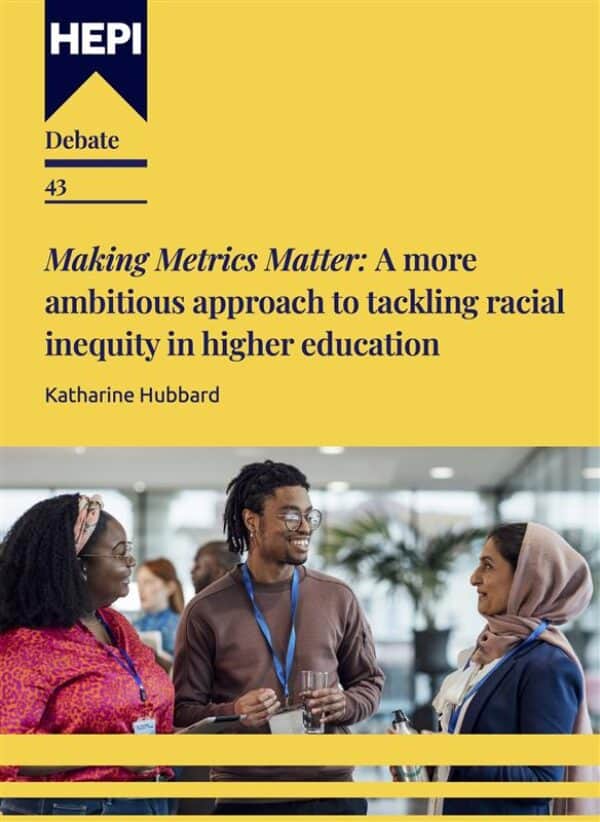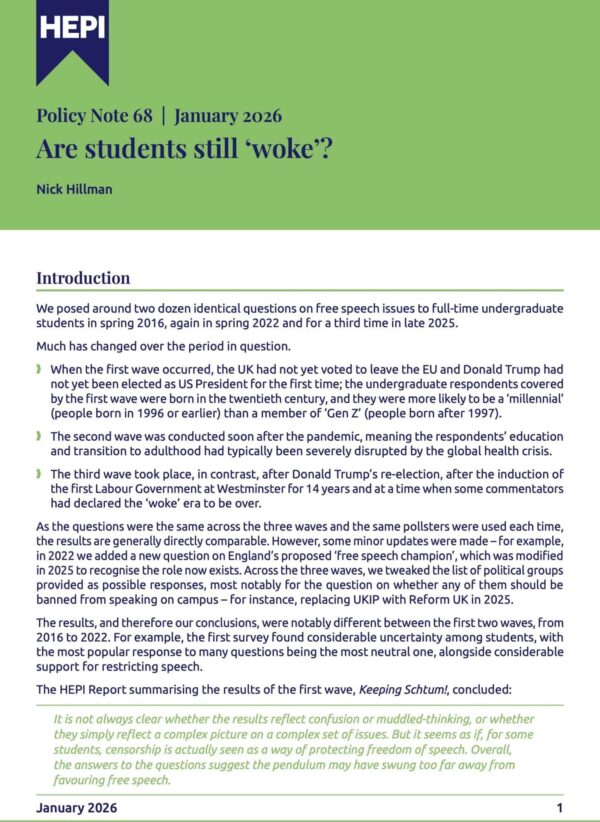The Immigration White Paper — an Indian student’s perspective
By Sanam Arora, Chair of the National Indian Students and Alumni Union.
Last week, I arrived back in London on a high. I’d spent five weeks in India with British colleagues promoting the benefits of U.K. higher education in seven cities. My audience was some of the most talented and entrepreneurial young people in the world, and they have plenty of choices about where to follow their dreams. But I know from my decade as Chair of the U.K. National Indian Students and Alumni Union (NISAU) that British education is an extraordinary opportunity for Indian students and their host country. It’s a win-win if ever there was one in talent, skills, investment and friendship. And all this was topped off with the announcement of the long-awaited India-UK trade deal. We were filled with possibility.
Yet as soon as I stepped off the plane, I was faced with a barrage of news stories about the UK Immigration White Paper. Would all our hard work be put at risk? Surely we would not jeopardise the Graduate Route Visa so vital to Indian graduates and hard-won by many, including Indian students and alumni.
So now the White Paper is published, what is our take on it?
The Graduate Route
First, let’s be clear. Our worst fears were averted. NISAU genuinely welcomes the Government’s decision to retain the Graduate Route and acknowledges the significant engagement that has taken place with stakeholders across the sector. NISAU has worked extensively over the past decade — and particularly intensively in the last year — with policymakers across all major political parties, including many now in government, to advocate for the continuation of this essential route.
Of course, there are still worries. Any change is worrying when witnessed from thousands of miles away. So while we are relieved that the Graduate Route has been preserved — albeit with a modestly reduced duration — we urge that its implementation, and that of the wider reforms, be approached with care, clarity, and collaboration. Getting this right will shape the UK’s standing as a top destination for global talent in the years ahead.
Why should we worry about a white paper on immigration?
But here’s the rub. Many of us feel the UK’s worries about immigration are being applied inappropriately. International students are a distinct, high-contribution, temporary category of migration. They fund their own education, power innovation in universities, sustain local economies and build enduring bilateral ties between the UK and countries around the world.
They (we) should be celebrated, not treated through the same policy lens as other forms of migration. Doing so risks undermining one of the UK’s most globally admired assets: its higher education sector.
Universities, too, are one of Britain’s most powerful strategic assets. They drive regional growth, advance global research, and help produce the high-skilled workforce the country urgently needs. Supporting them — and the students who choose them — must remain a national priority.
It’s an old argument, but worth repeating because it’s true. International students bring enormous benefits to the UK — to our high streets, workplaces, and campuses. They contribute billions to the UK economy each year, and the fees they pay help sustain vital subjects like Engineering and Medicine — courses which are essential to Britain’s long-term prosperity and global competitiveness.
International students also create employment and support domestic skills through their impact on the wider economy and the cross-subsidy they provide for UK teaching and research.
The White Paper talks about impact. But any local impact assessment or review of the domestic skills landscape should begin here — with a recognition that the presence of international students uplifts opportunities for UK nationals, not competes with them. And so we reiterate, no matter how often this request is dismissed, international students must be taken out of the net migration targets for purposes of robust policymaking and to ensure future efforts to reduce regular forms of migration don’t endanger this huge benefit.
Home thoughts from abroad
The White Paper was aimed, naturally, at a domestic political audience, but the world was listening. International communication must be extensively managed and properly executed — proactively and urgently — especially during this peak recruitment period. Panic must not be allowed to set in among current and prospective students. Immediate clarity is needed on who is affected and how.
It’s easy to forget what this takes, and GREAT campaign funding, which promotes campaigns like Study London, has already been cut by 41%. How will the great stories we should be telling about global education reach the right students in an appropriate way?
Think of the impact of our recent debates on Indian students, the largest users of the Graduate Route. For 70% of Indian students, a strong post-study work offer is the single most important factor in deciding where to study abroad. The ability to gain significant international work experience is critical. As we told the Migration Advisory Committee, work is not the same as work experience.
What we need now are proactive, student-focused communications, delivered by those who understand how to engage students effectively. NISAU has already started evidence-based communications. We stand ready to scale our role in partnership with UK stakeholders, but we must be quick. Rumours and bad actors must not be allowed to shape the UK’s story and, as Mark Twain said, a lie will fly around the whole world while the truth is getting its boots on. So we encourage a joined-up national communications effort, led by government and supported by trusted sector voices like NISAU, to ensure international students receive accurate, timely and reassuring guidance.
Skills and Immigration Alignment
Here we see real opportunity. We strongly support the Government’s move to align immigration policy with domestic skills development. This is not new to us. NISAU has long championed this principle. Our advocacy has enabled productive sectoral dialogue, including at our 2024 and 2025 national conferences, where we specifically advanced the case for better integration of immigration, training pipelines and national workforce planning. Now we look forward to working with stakeholders to ensure these reforms drive opportunity, not exclusion. International students and graduates should be part of this thinking, not passive recipients.
Tighter Regulation of Agents
We should be afraid, though, of naming and fixing problems. NISAU has spent nearly a decade calling for tighter regulation of education agents, so we are pleased to see this now reflected in government policy. We, of all people, see the cost of this being done badly.
However, implementation is everything. We urge clarity and accountability in the system, and ask for specific answers to:
- What is the penalisation mechanism for misconduct by agents?
- How can universities transparently share information on agent breaches?
- What channels will be created for students to report agent wrongdoing safely and easily?
So we recommend the following actions to ensure transparency and integrity:
- A sector-wide cap on agent commission to ensure that student interests are prioritised over volume incentives.
- Mandatory publication by universities of agent appointment processes and the fees paid to each agent, after every intake.
- Immediate monitoring of potential oligopolistic aggregators in the agent market, whose dominance may compromise student choice, competition, and accountability.
Agent reform must centre student welfare, market integrity, and institutional accountability.
Talent Route Enhancements
And finally, we welcome the strengthening of the Global Talent, Innovator Founder, and High Potential Individual routes. These are important to the UK’s economic ambitions, especially in strategic sectors such as AI, deep tech, and life sciences. But talent does not always arrive ready-made. It is nurtured — often from within our international student community.
International graduates are a strategic talent pool that can help meet the UK’s workforce gaps, drive innovation in small and medium enterprises (SMEs) and build globally competitive businesses. Retaining them through structured graduate-to-founder pathways is not just in students’ interests — it is in Britain’s. We therefore urge:
- A seamless pipeline between student, graduate, and entrepreneurship routes.
- The right for students to start businesses while studying.
- A bespoke international graduate start-up pathway, enabling the UK to tap into a future generation of founders, many of whom could otherwise take their innovation elsewhere.
Supporting graduate outcomes must also become a central focus across the UK higher education sector. A recent survey revealed that only 3% of international graduates found employment through their university careers service, highlighting a clear opportunity for improvement in how students are supported beyond the classroom.
This is not only a challenge for international students; domestic students, too, require more tailored and effective career support to meet the evolving demands of today’s job market.
NISAU has long championed the need for improved careers provision, including through regular engagement with universities and stakeholders, and as a central theme at both our 2024 and 2025 national conferences. At a plenary session during our 2025 conference in February, we demonstrated how the absence of structured university-led careers support has given rise to an unregulated ecosystem of social media ‘careers coaches’ — many of whom charge students significant fees, often without delivering meaningful outcomes. We recognise that many universities are already taking meaningful steps to enhance the student experience and graduate outcomes. From employability hubs to expanded industry partnerships, we welcome and encourage these efforts — and believe they can be further amplified through shared best practice, consistent investment, and greater collaboration with student-led organisations such as NISAU.
The White Paper on Immigration is challenging on skills. We call for a sector-wide paradigm shift — one that places measurable, inclusive, and industry-informed employability support at the heart of the student experience and ensures that students are not left to navigate their futures unsupported or exploited.
There is much more to say. We are concerned about a lack of clarity on graduate-level jobs and the financial impacts of all these changes on the universities that attract global students in the first place. Nor do we want to be seen only as investors. The ‘best and the brightest’ are not necessarily the ‘rich and the richest’.
We urge that any levies or associated costs placed on universities be ring-fenced for reinvestment into student support, careers, and compliance infrastructure, rather than passed on to students. Global education is changing. International students are discerning, strategic, and have options. If the UK offer weakens, the best talent will go elsewhere. The UK at the moment has a competitive advantage — that advantage must be protected through consistency, clarity, and commitment to the student experience. Let’s secure a UK that remains open, ambitious and globally competitive in higher education and in so many other ways.







Comments
Russell George says:
That 3% figure about finding employment through their Uni careers service is concerning and at odds with more positive reports regarding International students views on career service support such as the results in HEPIs own Paying over the odds report. Where’s the figure from?
Reply
Naseema kapasi says:
Appreciate what NASUA is saying but it should also consider looking on the other side of the coin and research on how Indian and international students are exploiting the higher education route UK offers. If you look at the certain areas on London and other cities, students are coming in the name of education and working illegally cash in hand and creating false economy. They are causing more harm to their future, as they all take huge debts to get into UK through this so called international student visa, but the main aim is to get in anyhow through any route and become uk citizen. And they do this through agents who offer their service to them to show them all the open loopholes how they can settle in uk. This illegality is impacting uk negetively and and UK is actually becoming island of strangers. Uk will eventually loose its britishness. Governments should take tougher and bring a rule for international student should return to their country after their post graduate study. Their own country should creat opportunity for students who return after their finishing education and take advantage of their talent. That way british born student can get opportunities their country has created for its own citizens
Reply
Sanam Arora says:
https://www.universitiesuk.ac.uk/universities-uk-international/insights-and-publications/uuki-publications/international-graduate-outcomes-2024
Reply
Add comment